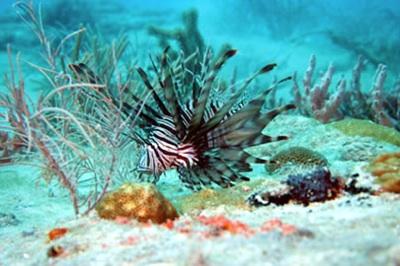A series of lionfish fishing derbies is scheduled for the coming weeks with hopes the poisonous fish that is invading coastal national parks in Florida and the Virgin Islands can be cut down before it gains a significant foothold and impacts native fishes and corals.
Though elegant in appearance with its waving spines, the Indo-Pacific lionfish has a voracious appetite and can out-compete the native snapper and grouper fisheries that are both commercially and ecologically important not just in the park, but throughout the Caribbean.
It's been thought that the species arrived in the waters of Biscayne National Park back in 1992 when Hurricane Andrew swept through the region and someone accidentally released several lionfish into the bay. And earlier this summer a lionfish was caught in the waters of Virgin Islands National Park.
With hopes of reducing its numbers, the National Oceanic and Atmospheric Administration's Florida Keys National Marine Sanctuary, in partnership with Reef Environmental Education Foundation (REEF), has scheduled a series of lionfish derbies. Divers who remove lionfish from sanctuary waters will be eligible for more than $10,000 in cash and prizes.
According to REEF, efforts have been under way since early 2009 to enlist Florida Keys divers to hunt down lionfish, which have no natural predator in the Atlantic.
“Current research is beginning to show that, if left unchecked, the impacts of lionfish could be devastating to our native marine life and coral reefs,” said Lad Akins, REEF director of operations. “Providing training and incentives for the public to remove lionfish is one way to control populations and minimize those impacts.”
In a release REEF officials said that one divers are briefed on how to catch and handle lionfish, they'll "be allowed to collect fish on the day of the tournament using hand nets or spearfishing gear in areas of the sanctuary where fishing and spearfishing is allowed. The $100 registration fee for a four-person team of divers or snorkelers provides participants with a pair of puncture resistant gloves" and tickets to an evening banquet where lionfish will be the main course.
“Eating lionfish is a conservation activity,” said Sean Morton, acting sanctuary superintendent. “We are its only known predator in the Atlantic and through dedicated diver-based removal efforts, and consumption of lionfish as a food source, we can control its establishment.”
For more information on the derbies and to register online, visit www.reef.org/lionfish. Dates and locations for the derbies are:
• Sept. 11 – Coconuts Restaurant, Key Largo
• Oct. 16 – Keys Fisheries Market and Marina, Marathon
• Nov. 13 — Hurricane Hole Marina, Key West
Florida Keys lionfish derbies are sponsored in part by: Ocean Reef Conservation Association, Divers Direct, Spree Expeditions, Inc., Dive Key West, Inc., and Scuba-Do Dive Company. To become an event sponsor, please contact [email protected].
REEF-coordinated lionfish derbies in the Bahamas have removed almost 2,500 lionfish since 2009. Thousands more fish have been captured in more than 30 REEF-organized lionfish collection trips across the Caribbean.
Florida Keys National Marine Sanctuary protects 2,900 square nautical miles of critical marine habitat, including coral reef, hard bottom, sea grass meadows, mangrove communities and sand flats.




Comments
a nice article but while mentioning the virgin islands you neglect to mention the absence of REEF, and NOAA from protecting the waters of the virgin islands, there efforts in our waters is kind of non existant and they have spent more time on non us waters in the caribbean. ST croix americas barrier reef is apparently alone in its removal programs, as of this writeing I have removed more lion fish than all other's put together with local dive shops and indivuals coming in second, NOAA and REEF efforts have resulted in 0 removals. and I cant help but wonder why.